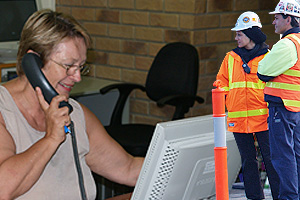Learn to supervise - gain the skills and knowledge to improve the running of a business.
A good supervisor or foreman can make a big difference in any workplace in many ways. They can improve productivity, job satisfaction, sustainability, staff retention and more.
 Study Supervision - develop your role as a valuable asset in any medium or large organisation.
Study Supervision - develop your role as a valuable asset in any medium or large organisation.- Understand the roles and qualities of a supervisor and be able to apply yourself in the workplace - essential for success in any small business.
- Learn about supervision in the workplace and explore opportunities for work and career development.
- Enhance your "people management" skills for your job or business.
Course Structure and Lesson Content
There are 10 lessons as follows:
1. Introduction
- Functions of a Supervisor.
- Organisational Structures and Hierarchy.
- Bases for Organisational Structure.
- Organisational Charts.
- Supervisors Responsibilities.
- How Supervisors Fit Into an Organisation.
- What Does a Supervisor Do.
2. Understanding the Workplace
- Government and Private Personnel Departments.
- Unions.
- Law and Employees.
- Contracted Responsibilities.
- Discrimination.
- Liability for Staff Actions.
- Workplace Elements.
3. Communications and Human Relations
- Influence in the Workplace (Formal Authority, Reward and Punishment, Knowledge, Leadership, Power, etc.).
- Familiarity.
- Managing Aptitude (Status, Prestige, Loyalty, Security, Friendship, Personality, Workload, etc.).
- Good Business Writing, Memoranda, Letters.
4. Motivating Employees
- Internal Incentives.
- Environmental Incentives.
- Practical Ways to Motivate.
5. Organising the Workplace
- Good Work Habits.
- Planning a Work Schedule.
- Establishing Priorities.
- Improving Results.
- Project Planning and Management Tools.
- Organising the Work Space.
6. Problem Solving Techniques
- Solving Problems.
- Guidelines for Making Decisions.
- Types of Problem Solvers.
- Different Ways to Solve Problems.
- Involving Others.
- A Classic Problem Solving Technique
7. Discipline, Complaints and Grievances
- Levels of Discipline (Reprimanding, Fixing, Blame, Formal Warning, Removing Privileges, Termination of Employment, Legal Action).
- Increasing Self-Discipline.
- Introducing Change.
- Giving Orders.
8. Interviewing, Recruitment, Training
- Job Interviews.
- Successful Interviewing.
- Resumes/C.V's.
- Training Staff.
- Staff Procedure Documents.
- Staff Contracts,
9. Workplace Safety
- Cost of Injury and Illness.
- Duty of Care.
- Accidents.
- Managing Manual Work Safely.
- Protective Equipment.
10. Dealing with Management/Worker Participation/Report Writing/Staff Meetings
- Purpose of Meetings.
- Leading a Meeting.
- Problems with Meetings.
- Meeting Documentation.
Course Aims
- Explain and create an organisational chart.
- Describe the five basic kinds of Unions.
- Report on what you expect to achieve by practising good human relations.
- Define objectives, goals, tasks to be achieved.
- Describe what steps should be taken before reorganising a section or department?
- Draw up a work area for an office, factory etc.
- Show step by step how you would work through the problem solving technique systematically, in order to determine a good way of dealing with this problem.
- Write a diplomatic letter to a union in response to a complaint.
- Draw up a suitable advertisement for a position of a "Salesperson"
- Explain the methods most frequently used to train new employees.
Supervision -A Key to Success
 The key to success of any company or organisation is good management and the key to good management is the Supervisor. Good supervision is, in fact, the single most important factor in the success of any advanced economy.
The key to success of any company or organisation is good management and the key to good management is the Supervisor. Good supervision is, in fact, the single most important factor in the success of any advanced economy.
What are the responsibilities of a supervisor? They must be able to:
-
Communicate with employees.
-
Give directions.
-
Dictate letters,
-
Set production goals and check performances.
- Give interviews.
-
Communicate with other supervisors.
-
Write reports and read them.
-
Check mail.
-
Attend meetings.
-
Make decisions about new projects.
-
Decide on promotions and demotions.
The skills needed to handle this array of tasks are -
a) Technical skills.
b) Human skills.
c) Conceptual skills.
This course develops your capacity to be a better supervisor in any situation.
As it develops these supervisory skills it does more though. Much of what you learn here can be applied in any situation throughout life, at a work level, or even in your social life or personal relationships.
This course has been developed and improved over more than 25 years and is an excellent choice of study.
Develop Your Abilities - Open Opportunities
Study Supervision and -
- Develop your abilities and your skills in dealing with different situations in the workplace.
- Contribute more directly to the success of departments, areas of business, or a business enterprise.
- Be more aware and more confident in how you interact with colleagues at all levels of business.
- Understand how businesses and individuals function within the workplace.
- Benefit from professional training - an extensively developed course with support and guidance to students from our expert Business and Management tutors.
You can enrol today, or, if you have any questions or want to know more about any of our courses -